Inside the Powerful Anti-Abortion Campaign to Convince You That Everything Is Just Fine
Late last month, shortly after the US Supreme Court stripped away federal protection for abortion rights, Dr. Christina Francis, an OB/GYN based in Fort Wayne, Indiana, took to Instagram with an urgent message: She wanted her followers to know that even in states where abortion will soon be illegal, doctors still would be able to terminate pregnancies to save the life of the mother. “Treating ectopic pregnancies or miscarriages or other life-threatening conditions in pregnancy is not the same thing as an abortion,” she said in a video she took of herself from inside a car. “This is very important to clear up because I know that many women are feeling fearful that they might not be able to receive life-saving care if they need it.” Commenters thanked Dr. Francis for her clarification. “The amount of people that don’t know the difference is disturbing,” said one. “So many people spreading false information. Thank you for sharing and educating!”
It’s not hard to see why the post took off: It came across as authoritative and reassuring during a period of great uncertainty. After the repeal of Roe v. Wade, many women and OBYGNs are very worried that they soon won’t be allowed to treat serious complications of pregnancy—like ectopic pregnancy, where a fertilized egg grows outside the womb. If left unattended because of concerns that removing it would be against laws prohibiting abortions, an ectopic pregnancy can potentially kill the mother if the pregnancy’s growth splits the fallopian tube in which it is most commonly housed. The calm clarity from Dr. Francis gave the impression of offering a clear path forward. In the days after she posted her video, it went viral on Instagram and TikTok.
But Dr. Francis left out a few key pieces of information about herself: She is a member of the anti-choice organization American Association of Pro-Life Obstetricians and Gynecologists (AAPLOG), as well as the anti-choice think tank Charlotte Lozier Institute. Her video was part of an all-out disinformation campaign by the anti-abortion movement to minimize the impact of the ruling on Roe—with an assist from powerful social media influencers who built their brand by spreading disinformation about Covid.
In addition to claiming that the law won’t affect pregnant women whose life is in danger, some influencers promote other false narratives downplaying the potential ramifications of the decision, assuring their followers that their access to contraceptives will be untouched, and their own lives won’t change. But that’s misleading, says Dr. Marta Perez, a board-certified OBGYN based in Austin, Texas. Now that Roe has been repealed, she explains, “even normal reproductive health care is going to have an extra layer of complexity and barriers.” People dealing with unexpectedly thorny pregnancies will have a harder time finding the care and treatment they need, no matter what their views on abortion might be. And there is some indication that not everyone would support abortions for conditions that endanger mothers: On July 16, three weeks after the Dobbs decision, Idaho Republicans at their annual convention voted to reject an amendment to their platform that would have made an exception to allow abortions that would save the life of the mother. The margins weren’t even close: 412 delegates voted no to the amendment, while just 164 voted yes.
“Anyone who has worked in reproductive healthcare has had a patient who has told the doctor, ‘I’m anti-abortion,’ and has [later] needed or wanted an abortion.”But even in places that do favor such exemptions, the difference between an abortion and a lifesaving pregnancy termination is not as stark as anti-abortion crusaders claim, Dr. Perez says. “Anyone who has worked in reproductive healthcare,” she says, “has had a patient who has told the doctor, ‘I’m anti-abortion,’ and has [later] needed or wanted an abortion.”
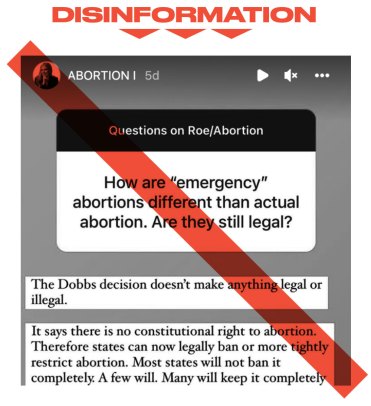
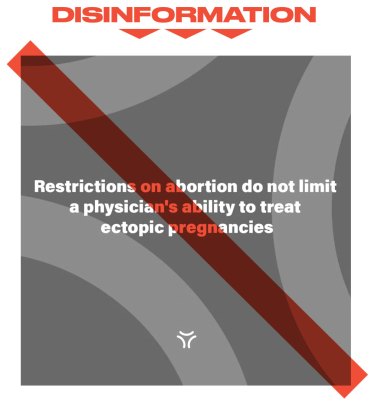

Dr. Francis isn’t the only anti-abortion activist claiming that treating life-threatening emergencies of pregnancy won’t count as abortion. In the weeks since Roe was overturned, a whole host of anti-abortion groups—some with large audiences—have deployed their social media accounts to push this idea, and memes and posts have taken off on Instagram. Live Action, an anti-abortion group with 510,000 followers, has been a powerful engine of disinformation about ectopic pregnancies and dangerous miscarriages, issuing misleading assurances that treatment of these conditions will continue. Similar groups with smaller followings have picked up the messages, as well. In a recent reel, an account called Prolife Millennial, with 28,000 followers, dismissed the notion that anyone would describe the termination of an ectopic pregnancy as an abortion as “100% just some crazy idea someone came up with to fear-monger.”
Contrary to these claims, the majority of obstetricians and gynecologists argue that it is time to be clear about the terminology. “Any end of any pregnancy—whether that happens spontaneously, which is commonly called a miscarriage; whether that is induced, which is commonly called an abortion; or whether that is in a place like the fallopian tube or elsewhere on the ovary or abdomen, which is called an ectopic pregnancy, and shouldn’t go on,” Dr. Perez says. “The ending of all pregnancies can be called an abortion because an abortion is a medical term for the end of pregnancies.”
Of course, the lawmakers enacting abortion bans are generally worried about induced abortions, Dr. Perez explains. But “because actual medical care is nuanced, there are times when these laws, especially when they carry heavy penalties for health care providers, are going to confuse care and it’s going to negatively affect all kinds of reproductive health care.” In 2019, for instance, Ohio lawmakers weighed a bill that would have required doctors to “reimplant an ectopic pregnancy” into a person’s uterus—or face murder charges. (Just to be clear, ectopic pregnancies can be life-threatening if untreated and are never viable). After doctors denounced the idea—one labeled it “pure science fiction”—the bill never made it out of committee.
Still, confusion about ectopic pregnancies remains, leading to real-life consequences. A recent AAPLOG Instagram post argued that “restrictions on abortion do not limit a physician’s ability to treat ectopic pregnancies.” Yet late last year, an Austin, Texas, a pharmacy sent a letter to local OBYGNs saying it would no longer fill prescriptions for methotrexate because of recently passed Texas laws. The drug, which is also used to treat other conditions, including rheumatoid arthritis and cancer, prevents rapidly dividing cells from continuing to divide and is prescribed to some patients with ectopic pregnancies so that the pregnancy doesn’t continue growing in the abnormal and dangerous location. The longer it takes for a patient to find the drug, the more risk of surgery, hemorrhage, or death. According to a letter the Texas Medical Association sent the Texas Medical Board, a state agency, on July 13, one Central Texas hospital told a physician to delay treating a patient with an ectopic pregnancy until it ruptured because the hospital feared litigation, the Dallas Morning News reported. “There aren’t meant to be laws governing these things,” Dr. Perez argues. “They’re supposed to be part of your normal medical care.”
Though lawmakers carved out exceptions for life-threatening situations in many of their abortion bans, these exceptions are often more ambiguous than they first appear. Suppose a patient checks into Massachusetts General Hospital because her water has broken early—a condition called premature rupture of membranes. She will likely be counseled to abort the pregnancy because of the high risk of infection and sepsis, and the dismal prognosis for the fetus, says Dr. Erin Bradley, an OBGYN at Mass General and an associate professor at Harvard Medical School. But in states like Texas, which now criminalizes abortion after six weeks, doctors “have already had to change how they practice medicine because of fears of litigation,” Dr. Bradley explains. After the passage of Senate Bills 4 and 8, at least some Texas hospitals now tell doctors that if the fetus still has a heartbeat they should not intervene with a patient with rupture of membranes unless the patient becomes septic and her life is imminently in danger. At that point, it might be too late.
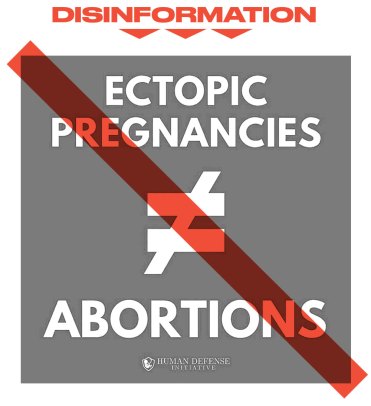
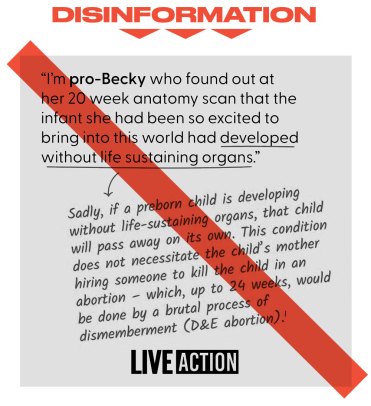
Dr. Bradley points to early findings from a recent study at two Texas hospitals published in the American Journal of Obstetrics and Gynecology showing that “state mandated expectant management” (the sit-and-wait approach) for pregnancy complications like rupture of membranes was associated with “significant maternal morbidity.” Fifty-seven percent of patients treated with expectant management ended up critically ill (i.e. hemorrhaging or requiring a hysterectomy), compared with 33 percent of patients who chose to have abortions under similar circumstances in states without the legislation. The legislation is “already hurting people in real time, and it’s only gonna get worse,” Dr. Bradley says.
On July 11, the Biden administration attempted to cut through the confusion, telling hospitals in all states that under existing federal law, they must provide abortions if a mother’s life is believed to be at risk, as defined by the Emergency Medical Treatment and Labor Act. As the Department of Health and Human Services reminded hospitals in a letter, if they fail to abide by EMTALA, which preempts state law, they could face government penalties or lose Medicare funding. Days after HHS released its letter, Texas Attorney General Ken Paxton filed a lawsuit calling Biden’s guidance illegal and saying that it forces Texas doctors to choose between violating state law or risking losing federal funding. “The Biden Administration seeks to transform every emergency room in the country into a walk-in abortion clinic,” Paxton said when he announced the suit.
“The Biden Administration seeks to transform every emergency room in the country into a walk-in abortion clinic.”A post on Live Action’s website published in response to HHS’s directive had a similar tenor. “Doctors do not have to kill babies in order to save women,” the post stated, claiming that if a pregnant person’s life is at risk, “doctors can instead deliver a baby further along in gestation via an emergency C-section which takes under an hour.” But the belief that a patient in the midst of a medical emergency can always just wait a little longer until they can deliver a fetus—the idea that someone should prioritize the health of the fetus over their own health, future fertility, and potentially their own life—is not only a twisted fantasy, it’s becoming a dark reality.
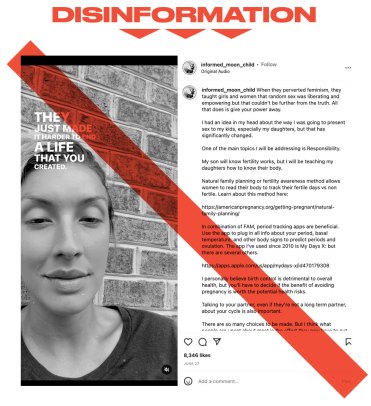
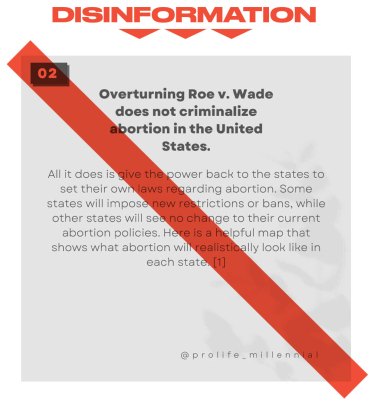

While doctors struggle to navigate this new landscape, social media stars who built their following promoting conspiracy theories about Covid and vaccines are busy trying to convince their fans that the repeal of Roe is just a legal move and not really that big of a deal. One of those influencers is Christiane Northrup, a vehemently anti-vaccine naturopathic doctor who also embraces parts of the QAnon conspiracy theory. Last week, she claimed to her 77,000 Telegram followers that the striking down of Roe “has nothing to do with banning abortion.” Rather, she insists, it was a decision about states’ rights. “If you need an abortion, go to a state where you can get one if you live somewhere where it’s truly banned (although I doubt that would ever be the case).” On the contrary, there are now 8 states that completely ban abortion, and more are expected to do so soon.
Was the repeal of Roe really just about states’ rights? “Overturning Roe was about abortion—you cannot separate the two,” counters Elizabeth Nash, the principal policy associate on state issues at the Guttmacher Institute. “We know that this has been a coordinated campaign by anti-abortion organizations and politicians for a very long time.” Why else, when Brett Kavanaugh was elected to the Supreme Court, did states start enacting 6-week and total abortion bans? They wanted to spark a lawsuit that would go to the Supreme Court, Nash explains, “because they were anticipating overturning Roe.” Arguing that it’s about federal overreach is “a calculated move to try to distract people from the fact that we are expecting about half of the states to ban abortion within the next several months.”
Feminist-icon-turned-antivax-superstar Naomi Wolf also made the states’-rights argument in a rambling recent Substack post. Then she took it a step further, adding that the defeat of Roe was a “necessary evolution in the law, in response to women’s ascendancy in America over the last fifty years.” To bolster this argument, Wolf argues that birth control has made abortion all but unnecessary. “An American woman does have choices and powers she did not have in 1973,” she writes. “She can buy contraceptives.”
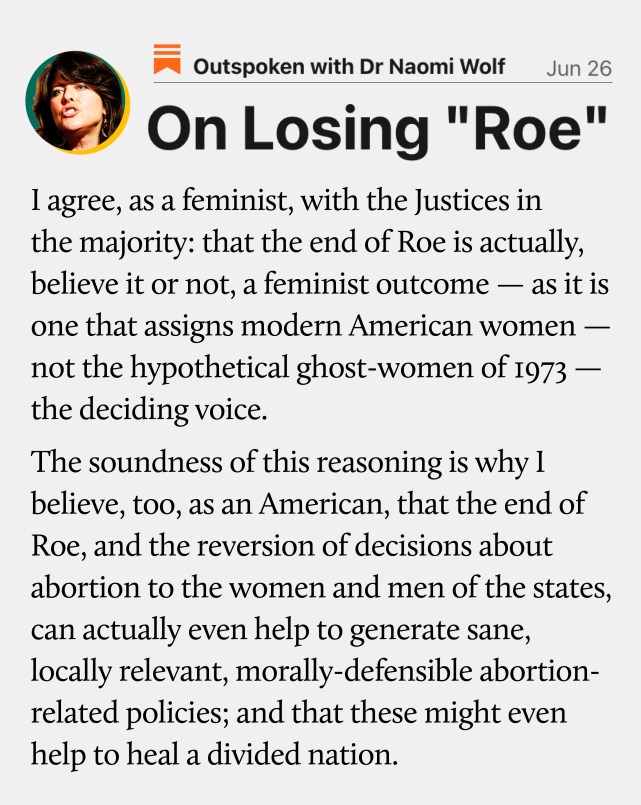 Mother Jones illustration; Brian Cahn/ZUMA
Mother Jones illustration; Brian Cahn/ZUMA
But can she? Mother Jones has covered how anti-abortion activists are waging a war on hormonal birth control and Plan B by claiming that it’s equivalent to abortion. For example, Allie Beth Stuckey, a conservative pundit and podcaster with 414,000 Instagram followers, pivoted from posting screeds about vaccine mandates, critical race theory, and immigrants to making claims about the implications of the Dobbs decision. In a recent Instagram reel, she took on the issue of birth control. When a follower asked what she thought of the idea that IUDs could become illegal, she answered, “Not true, but it’s very revealing that they’re bringing this up. They are basically conceding what we already know: hormonal birth control, including IUDs, can be abortifacient because they can kill a fertilized egg rather than preventing ovulation.” In some places, this argument seems to be working: A hospital system in Missouri temporarily stopped prescribing the Plan B pill in the days after Roe was overturned.
That decision wasn’t in line with what most experts believe, which is that until a fertilized egg implants in the uterus, it isn’t a pregnancy at all, and therefore no abortion has occurred. For this reason, the American College of Obstetricians and Gynecologists considers hormonal contraceptives, including the Plan B morning-after pill, preventative rather than abortifacient. “It is a medical fact that no contraceptive method is an abortifacient—period,” says Dr. Perez. “An IUD, Plan B, or any other emergency contraception is not an abortifacient—period.”
“It is a medical fact that no contraceptive method is an abortifacient—period. An IUD, Plan B, or any other emergency contraception is not an abortifacient—period.”And what about the tragic decision that some pregnant people are confronted with, when tests reveal a fetus suffers from serious genetic anomalies? Enter another strain of misleading posts, such as one promoted by Live Action, which seeks to convince readers that abortions aren’t necessary in cases where a fetus has severe birth defects—because, according to the group, the fetus will automatically die “on its own.”
Some fetal anomalies or genetic abnormalities do result in stillbirth, but “not all of them do,” Dr. Perez explains. Some lead to a child who dies soon after birth, or in early childhood. As part of her job, Dr. Perez meets with patients to relay this type of finding and help them process the news. And the patients often end up feeling like “the very best, most compassionate thing for their families is ending the pregnancy,” she says.
Perhaps the most outlandish claim we found came from Peggy Hall, a former professor of education at the University of California, Irvine who built her social media brand over the last few years by railing against vaccine and mask mandates. (Her tagline: “Breathing life back into liberty!”) Last month, a video that she shared with her 51,000 Instagram followers posited that the Supreme Court overturned Roe just to cover up the declining birthrate caused by widespread infertility resulting from the Covid vaccines, which will cause a steep drop in the national abortion rate, since fewer babies will be born. “Now there’s a justification for the drop in abortions!” she said. (There is a great deal to unpack here but suffice to say there is zero evidence that vaccines cause infertility.)
Disinformation about abortion has been ongoing for decades, Nash, the Guttmacher state policy expert notes, so it’s not surprising there’s been so much of it since the Dobbs decision dropped. And with the burgeoning power of social media, it is getting even more difficult to combat. She thinks it would be helpful if there were some kind of disclaimer on the online platforms hosting disinfo-minded influencers. Twitter and Facebook both issued new rules cracking down on users spreading Covid misinformation, for instance. Without any referees, bad information spreads easily online, and “people buy into it because they’re not looking at it critically,” Nash says. “So it makes it difficult to make sure people have real factual information at their fingertips.”
As a result, bad information continues to circulate, warping people’s perceptions of a common and safe medical procedure that has saved countless lives, in more ways than one. And the chasm between the theoretical idea of abortion and the lived reality of millions of people widens. People count on abortions to make “countless life decisions,” wrote three Supreme Court Justices in their Dobbs dissent, from where to live to how to allocate finances to how to approach relationships to how to deal with unanticipated diagnoses during pregnancy. The majority’s opinion to remove that protected right, the justices continued, “exists far from the reality American women actually live.”
Their fears are already coming to pass, as anti-choice groups’ misleading messages about the new laws percolate on social media. In one birth-related Facebook group, a member recently said she was worried about becoming pregnant under the new laws. “I’ve been told they’d criminalize you for miscarriages,” she wrote. “I haven’t heard back from the doctor to confirm if this is true or not.” Her fellow members lined up to reassure her in the comment. “No way, this ruling is all about less government intervention,” responded one. Another added that “there wouldn’t be enough room in the jails” if miscarriages were criminalized. “Everything is getting better,” she wrote. “Blessings to you and your growing family!”
Copyright
© Mother Jones
